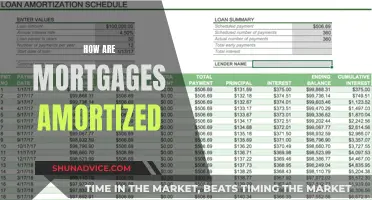
Lying on a mortgage application is a form of financial deception and is considered mortgage fraud, which is illegal. It can have serious consequences, including criminal charges, fines, imprisonment, and damage to your credit score. People often lie or exaggerate to get a bigger loan, smaller down payment, or better mortgage rate, but mortgage lenders have ways to verify the information provided, and if any discrepancies are found, it can result in the application being denied or even legal action being taken. Therefore, it is essential to be honest and upfront when applying for a mortgage to avoid any legal, financial, or reputational risks.
| Characteristics | Values |
|---|---|
| Nature of the crime | Mortgage fraud, financial deception |
| Reasons | To get a bigger loan, smaller down payment or a better mortgage rate |
| Examples of lies | Income, employment history, debt, marital status, number of dependents |
| Consequences | Criminal charges, fines, imprisonment, civil penalties, loss of loan, damage to credit score |
| Severity of punishment | Depends on the nature of the fraud |
| Other repercussions | Foreclosure, repossession, missed payments, bankruptcy |
What You'll Learn
- Lying about your income can lead to jail time
- Misrepresenting your employment history is mortgage fraud
- Concealing credit issues or debts will be uncovered
- Falsifying documents will lead to criminal charges and fines
- Exaggerating at the suggestion of a mortgage broker will not absolve you of fraud charges

Lying about your income can lead to jail time
Lying on a mortgage application is a form of mortgage fraud, which is a federal crime. While it may seem tempting to stretch the truth to secure a loan, doing so can have serious repercussions, including criminal charges, civil penalties, and jail time.
Mortgage lenders have sophisticated underwriting processes designed to detect fraudulent information. They will verify your income, employment history, and debt. Fake jobs or inflated salaries will be red-flagged, and forged documents are easier to spot than you may think. If a lender uncovers deception during the underwriting process, they will almost certainly deny your mortgage application. If they discover it after approving your loan, they can call the mortgage due immediately in full.
Lying about your income is a common form of mortgage fraud. It occurs when individuals believe they don't earn enough to qualify for a mortgage. However, this is unnecessary, as a good broker can help you find a mortgage that fits your financial situation. For example, you may be able to secure a high salary multiple of 5 to 5.5 times your salary or consider supplementary income options while remaining above board.
The consequences of lying on a mortgage application can be severe and may include criminal charges, civil penalties, and jail time. Prosecutions for mortgage fraud have risen dramatically since the 2008 housing crisis, with the Department of Justice aggressively pursuing offenders. Private lenders are also increasingly taking legal action against borrowers who falsify information.
In addition to criminal charges, those found guilty of mortgage fraud may face civil penalties, including paying restitution to the victims and covering the costs incurred by the lender or other affected parties. The penalties for mortgage fraud can be significant, with maximum penalties of up to 30 years in a federal penitentiary and $1,000,000 in fines for the most egregious cases. While you may not face the maximum penalties, even lesser charges can result in probation, thousands of dollars in fines, and potential jail time.
Mortgage Broker Payment Methods in Australia: What You Need to Know
You may want to see also

Misrepresenting your employment history is mortgage fraud
Lying on a mortgage application is a form of mortgage fraud and a serious offence. It is a criminal act that can carry hefty fines and even imprisonment. Mortgage fraud is a form of financial deception, and misrepresenting your employment history is a type of fraud. Lenders will want to see a history of receiving income, and they will want to confirm that your income is enough to make the payments on the loan. They will also want to see at least two years of stable employment and income, making you less of a risk of defaulting on your loan. Lenders will want to verify your position, salary, and work history, and they will contact employers and review documents such as pay stubs and tax returns.
If you are self-employed, lenders often require an Internal Revenue Service (IRS) Form 4506-T, which allows them to receive a copy of the borrower's tax returns directly from the IRS. They may also ask for attestation by a certified public accountant (CPA) to confirm income. Lenders will also want to see documentation of your earnings if you have income from a rental property.
Falsifying employment information will likely get you nowhere, as tax returns and pay stubs are frequently reviewed with loan applications. Lenders will also want to see that you have a steady income if you are self-employed. They will also want to confirm that your income is enough to cover the loan payments.
Mortgage fraud can have serious consequences, including the denial of the loan, foreclosure, and damage to your credit score. It can also lead to civil penalties, such as paying restitution to the victims and covering the costs incurred by the lender or other affected parties. It is always best to be honest and upfront about your employment history and income when applying for a mortgage.
Discover Scorecard Mortgage: How Accurate Are These Assessments?
You may want to see also

Concealing credit issues or debts will be uncovered
Lying on a mortgage application is a form of financial deception and is illegal. Falsifying information about your credit card balances or other outstanding debts on a mortgage application will be uncovered. Lenders will check how much credit you have and how much of it you are using, which is known as 'credit utilisation'. Banks calculate this by dividing your current debt by your available credit limit. As a general rule, it is best to keep this under 30%.
Lenders will also check how good you have been with making your previous credit repayments. They will also look at your income, deposit, and credit history to determine whether or not you are approved. While it is possible to get a mortgage with credit card debt, the size of your outstanding balances could affect how much you can borrow. Some lenders might be hesitant to lend to you if you have a lot of credit cards and have used most of your credit limit.
Courthouse records of bankruptcy, judgments, paid tax liens, and foreclosures will remain on your credit report for 7-10 years, impacting your credit score and mortgage loan application. Any events like these need to be disclosed to your lender.
If the lender discovers that false information was provided during the application process, they can deny the mortgage application outright. If the borrower cannot meet the mortgage payments due to the fraudulently obtained loan, the lender can initiate foreclosure proceedings, resulting in the loss of the property. Mortgage fraud can also seriously damage a person's credit score.
Understanding Mortgage Compounding: Your Guide to Interest Calculations
You may want to see also

Falsifying documents will lead to criminal charges and fines
Falsifying documents is a type of white-collar crime that involves altering, changing, or modifying a document to deceive another person or organization. It is considered a serious offense that can result in criminal charges and penalties, including incarceration and hefty fines. The penalties for falsifying documents can vary depending on the jurisdiction and the nature of the crime.
In the context of mortgage applications, falsifying documents or providing misleading information can lead to criminal charges and significant fines. Mortgage fraud is a form of financial deception where individuals intentionally provide false information to obtain a home loan or favourable loan terms. This can include misrepresenting income, assets, debt, or employment history.
The consequences of engaging in mortgage fraud can be severe. Individuals found guilty may face criminal charges, civil penalties, and professional repercussions. Criminal charges can result in incarceration, with potential prison sentences ranging from a few months to 30 years, depending on the severity of the fraud. Fines imposed for mortgage fraud can also be substantial, ranging from thousands to millions of dollars.
Additionally, civil penalties may apply, including paying restitution to victims and covering the costs incurred by the lender or other affected parties. Those who work in the real estate industry, such as mortgage brokers, appraisers, or real estate agents, may face additional penalties such as license revocation, fines, and damage to their professional reputation.
The penalties for falsifying documents in a mortgage application are designed to deter individuals from engaging in fraudulent activities. It is important to understand the repercussions and the likelihood of being caught, as lenders have stringent processes to verify the information provided by applicants.
The Mortgage Assessment: Key Factors for Applicants
You may want to see also

Exaggerating at the suggestion of a mortgage broker will not absolve you of fraud charges
Lying on a mortgage application is a serious offence and is considered mortgage fraud. It is illegal and can lead to severe consequences, including criminal charges, fines, and even prison time. Mortgage fraud can be committed by both borrowers and mortgage professionals, such as brokers, loan officers, and real estate agents. Exaggerating or providing misleading information on a mortgage application, even at the suggestion of a mortgage broker, is still considered fraud and can result in legal repercussions.
The consequences of engaging in mortgage fraud can be significant. If convicted, individuals may face criminal charges, including fines and imprisonment. In the United States, mortgage fraud can be prosecuted in federal or state court, with penalties varying depending on the jurisdiction. In federal court, mortgage fraud may be charged as wire or mail fraud, while state courts may define criminal fraud differently. However, in general, mortgage fraud is considered a felony offence, and individuals may face fines of up to $1,000,000 and prison sentences of up to 30 years in federal court. Even if an individual does not end up serving time in prison, they may be placed on probation and ordered to pay restitution to the victims, covering any losses incurred by the lender or other affected parties.
It is important to understand that following the advice of a mortgage broker or loan officer to exaggerate or misrepresent information does not absolve you of fraud charges. Your signature on the mortgage application signifies your liability, and you will be held responsible for any false or misleading statements. While the mortgage broker or loan officer who provided the advice may also face consequences, including prosecution, this does not release you from your responsibility. It is always best to provide truthful and accurate information on a mortgage application to avoid any legal repercussions.
Additionally, mortgage fraud can have long-lasting effects on your financial well-being. A conviction for mortgage fraud can damage your credit score, impacting your ability to obtain credit or loans in the future. It may also affect your ability to purchase or maintain ownership of a property. Lenders have stringent verification processes in place, and it is unlikely that misleading or false information will go undetected. Background checks and income verification procedures are commonly used to identify any discrepancies or false representations. Therefore, it is crucial to be transparent and honest when providing information on a mortgage application.
In summary, exaggerating or misrepresenting information on a mortgage application, even when advised by a mortgage broker, is considered mortgage fraud and can result in serious legal consequences. Individuals may face criminal charges, fines, imprisonment, and long-lasting financial repercussions. It is essential to seek independent legal advice and provide truthful information to avoid these severe outcomes.
Late Mortgage Payment: One Day, Big Trouble?
You may want to see also
Frequently asked questions
Mortgage fraud is a form of financial deception that occurs when individuals or entities intentionally provide false or misleading information on a mortgage application to obtain a home loan or secure more favourable loan terms than they would otherwise qualify for.
The consequences of lying on a mortgage application can be severe and may include denial of the loan, foreclosure, and damage to credit scores. Lying on a mortgage application is illegal and can result in criminal charges, civil penalties, and professional repercussions.
Yes, there are two main types of mortgage fraud: "opportunistic" fraud and "large-scale" fraud. Opportunistic fraud involves lying about personal finances to secure a mortgage, while large-scale fraud is often linked to organised crime or money laundering and carries stricter penalties.
Some common lies told on mortgage applications include misrepresenting income, employment history, debt, or the intended use of the property. Applicants may also lie about being a first-time buyer or fail to declare credit cards or other debts.
The chances of getting caught lying on a mortgage application are relatively high. Lenders typically verify the information provided by applicants and will uncover any misleading statements or false information. It is strongly advised that applicants do not attempt to provide incorrect information as it is illegal and can lead to serious consequences.







